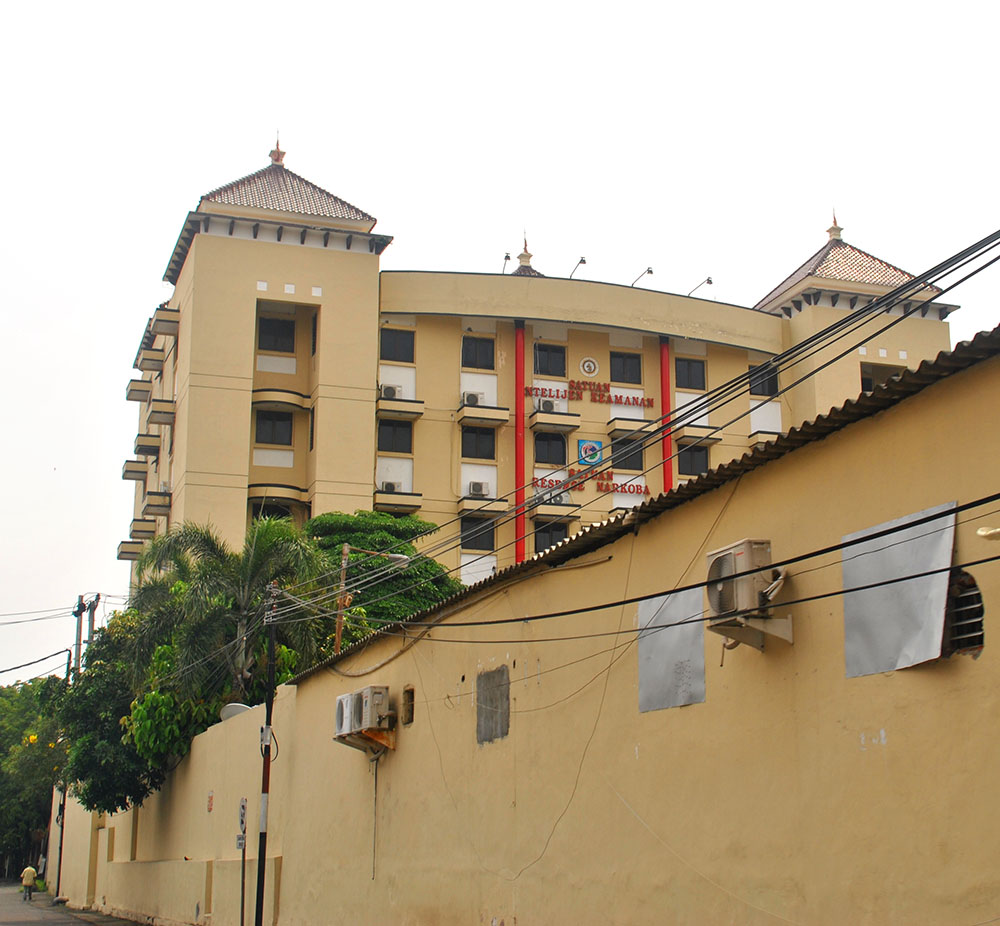The Drug Problem in Surabaya’s Ghetto
On 18 April 2024, 11 people were arrested for drug consumption in Jl. Kunti, Surabaya. This episode serves as a stern reminder that drug circulation and addiction remain rampant in the second-largest city in Indonesia.
In 2023, drug cases topped the city’s crime rates, accounting for 787 of the total 2,156 criminal cases (36 percent). Vehicle theft (25 percent) and aggravated theft (15 percent) make up the other crimes. Jl. Kunti has often been regarded as a drug-ridden kampong (village). Eradicating the drug problem in this area remains a challenge. How can the city be drug-free?
Surabaya residents and those living around Jl. Kunti associate the area with various kinds of drugs, especially methamphetamine (locally known as sabu-sabu). The police frequently arrest drug traffickers and consumers in the area, with the biggest recent bust taking place in March 2021. Four hundred and fifty security personnel, including police officers, raided the kampong to arrest three drug dealers. However, the raid was unsuccessful as two suspects had fled the scene due to prior knowledge through an information leak. The regular failures of security personnel enforcing the law further cemented Jl. Kunti’s reputation as a drug haven.
Jl. Kunti remains popular for drug dealers or traffickers because it provides facilities for addicts to consume drugs. Traffickers would normally erect makeshift huts made from wooden poles and tarpaulin sheets in different small streets or alleys in the kampong for consumers to freely take drugs. Others provide rooms in their houses for consumers. Consuming drugs on the spot is known in local terms as “andok.” The area has been a popular spot for taking drugs for nearly 25 years. Addicts felt safe consuming drugs in the area since they were protected by drug dealers and residents.

Fig. 1: Police station in Surabaya. [Photo courtesy of Wikimedia Commons user inBaliTimur and reprinted under Creative Commons license, 2017.]
The economic benefits underlying the drug trade make eradicating the trend difficult. For many, selling drugs is a livelihood, whether part-time or full-time. For instance, an individual who ran a petrol retailer shop in Jl. Kunti also served as a drug trafficker to earn additional income. Although the police eventually caught him, his case highlights that economic motivations remain a decisive factor for the persistence of drug trafficking in the area.
More importantly, corruption within law enforcement agencies significantly hampers efforts to combat the drug problem effectively. Some police personnel were involved in the circulation of drugs in Jl. Kunti and its surrounding area, making it even more challenging to eradicate the drug problem. These officers shielded drug traffickers operating in Jl. Kunti and in other parts of Surabaya, allowing them leeway in distributing drugs across the city. In March 2021, three police personnel were arrested for receiving kickbacks (regularly for six months) from drug traffickers at Jl. Kunti. There is enough evidence showing some police officers protecting drug traffickers in the area. Despite the arrest, drug trafficking continued to thrive, which suggests that these disciplinary efforts were ineffective in deterring corruption among other officers.
Deeper involvement by local people and police personnel prevented Surabaya metropolitan police from rooting out the practice entirely. In October 2021, the Surabaya metropolitan police conducted the biggest raid in Jl. Kunti with 450 police personnel involved in the raid. The police interrogated hundreds of people who lived in areas surrounding Jl. Kunti. They combed the area thoroughly but could only arrest one out of the three drug dealers who were the subject of police’s target. The escape was possible due to a tip-off, either from corrupt police officers or residents who have an interest in maintaining the drug trade in the area.

Fig. 2: Postage stamps from Indonesia, promoting a campaign against drug abuse in villages. [Photo courtesy of Post of Indonesia via Wikimedia Commons, 2019, Public Domain.]
While the complicity of police personnel complicates efforts to resolve the drug problem in the area, alleviating the issue is not entirely impossible, as demonstrated in Jakarta’s experience of successfully transforming the “drug kampong” in Kampong Bali, Central Jakarta, into a drug-free area. Between 1995 and 2005, Kampong Bali became a popular spot for drug traffickers, but it has since gradually become a drug-free area. Cooperation among various government stakeholders was needed to ensure the success of the anti-drug movement. In the case of Kampong Bali, the police established a post in the area to monitor its security and crime situation, and to deter drug traffickers from operating. The police also organised frequent, random anti-drug tests on residents and conducted regular raids. In addition, the Jakarta metropolitan police organised monthly evaluation to assess the effectiveness of their programs.
The Jakarta government, residents, and the National Anti-Drug Body (Badan Narkotika Nasional) also collaborated to provide job training for drug traffickers to help them find alternative jobs to sustain themselves economically. This was important because joblessness and economic reasons were major factors causing many to turn to drug trafficking. One of the trainings provided by the government and stakeholders included bringing trainees closer to the Betawi culture, which is native to the people of Jakarta. Following that, former drug traffickers and addicts were hired to perform Betawi songs or dances in Betawi-style weddings or other cultural events in areas of Greater Jakarta, including Depok, Tangerang, and Bogor. These initiatives serve as a more sustainable source of income for former drug traffickers and recovering addicts.
While much remains to be done in eradicating drug issues in Jl. Kunti and its surrounding area, the Jakarta experience in alleviating its drug problems is worth noting and emulating by stakeholders in Surabaya, including the Surabaya Metropolitan Police and the city mayoralty government.
A’an Suryana is Visiting Fellow at Regional Social and Cultural Studies Programme (RSCS), ISEAS Yusof Ishak Institute. He is also lecturer in Political Science at the Faculty of Social Sciences, Universitas Islam Internasional Indonesia (UIII). Email: aan_suryana@iseas.edu.sg